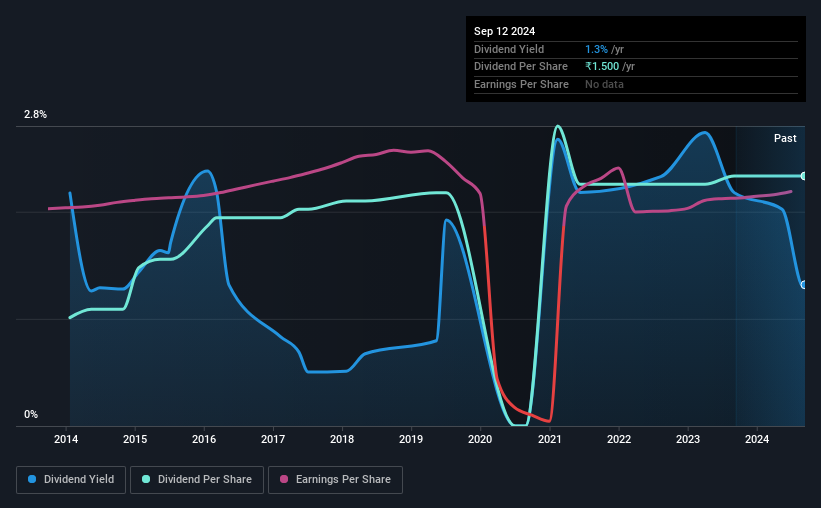- India
- /
- Capital Markets
- /
- NSEI:EDELWEISS
Edelweiss Financial Services Limited (NSE:EDELWEISS) Goes Ex-Dividend Soon

Edelweiss Financial Services Limited (NSE:EDELWEISS) stock is about to trade ex-dividend in three days. The ex-dividend date occurs one day before the record date which is the day on which shareholders need to be on the company's books in order to receive a dividend. It is important to be aware of the ex-dividend date because any trade on the stock needs to have been settled on or before the record date. Thus, you can purchase Edelweiss Financial Services' shares before the 17th of September in order to receive the dividend, which the company will pay on the 27th of October.
The company's next dividend payment will be ₹1.50 per share. Last year, in total, the company distributed ₹1.50 to shareholders. Looking at the last 12 months of distributions, Edelweiss Financial Services has a trailing yield of approximately 1.3% on its current stock price of ₹113.77. If you buy this business for its dividend, you should have an idea of whether Edelweiss Financial Services's dividend is reliable and sustainable. As a result, readers should always check whether Edelweiss Financial Services has been able to grow its dividends, or if the dividend might be cut.
Check out our latest analysis for Edelweiss Financial Services
If a company pays out more in dividends than it earned, then the dividend might become unsustainable - hardly an ideal situation. Fortunately Edelweiss Financial Services's payout ratio is modest, at just 29% of profit.
Companies that pay out less in dividends than they earn in profits generally have more sustainable dividends. The lower the payout ratio, the more wiggle room the business has before it could be forced to cut the dividend.
Click here to see how much of its profit Edelweiss Financial Services paid out over the last 12 months.

Have Earnings And Dividends Been Growing?
Companies with falling earnings are riskier for dividend shareholders. If earnings fall far enough, the company could be forced to cut its dividend. Edelweiss Financial Services's earnings per share have fallen at approximately 17% a year over the previous five years. When earnings per share fall, the maximum amount of dividends that can be paid also falls.
Another key way to measure a company's dividend prospects is by measuring its historical rate of dividend growth. Edelweiss Financial Services has delivered an average of 8.7% per year annual increase in its dividend, based on the past 10 years of dividend payments.
To Sum It Up
Is Edelweiss Financial Services worth buying for its dividend? Earnings per share have shrunk noticeably in recent years, although we like that the company has a low payout ratio. This could suggest a cut to the dividend may not be a major risk in the near future. In sum this is a middling combination, and we find it hard to get excited about the company from a dividend perspective.
If you're not too concerned about Edelweiss Financial Services's ability to pay dividends, you should still be mindful of some of the other risks that this business faces. To help with this, we've discovered 4 warning signs for Edelweiss Financial Services (1 is a bit concerning!) that you ought to be aware of before buying the shares.
A common investing mistake is buying the first interesting stock you see. Here you can find a full list of high-yield dividend stocks.
Valuation is complex, but we're here to simplify it.
Discover if Edelweiss Financial Services might be undervalued or overvalued with our detailed analysis, featuring fair value estimates, potential risks, dividends, insider trades, and its financial condition.
Access Free AnalysisHave feedback on this article? Concerned about the content? Get in touch with us directly. Alternatively, email editorial-team (at) simplywallst.com.
This article by Simply Wall St is general in nature. We provide commentary based on historical data and analyst forecasts only using an unbiased methodology and our articles are not intended to be financial advice. It does not constitute a recommendation to buy or sell any stock, and does not take account of your objectives, or your financial situation. We aim to bring you long-term focused analysis driven by fundamental data. Note that our analysis may not factor in the latest price-sensitive company announcements or qualitative material. Simply Wall St has no position in any stocks mentioned.
About NSEI:EDELWEISS
Edelweiss Financial Services
Provides financial products and services to corporations, institutions, and individuals in India.
Established dividend payer with questionable track record.
Similar Companies
Market Insights
Community Narratives




